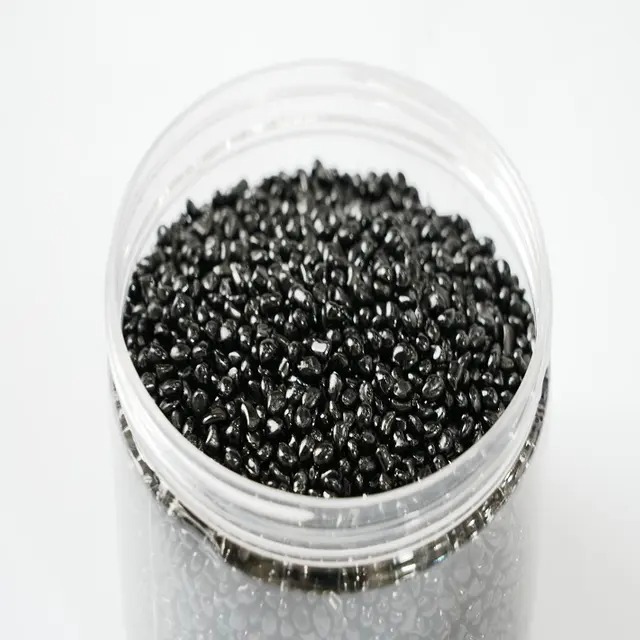
Introduction
Black masterbatch is a cornerstone additive in plastics manufacturing, widely used to impart rich color, improve UV resistance, and enhance performance. Among the many grades available, Black Masterbatch N62 stands out for its high content carbon black, making it particularly relevant for industries requiring both deep color and functional properties.
But one important question arises: Can Black Masterbatch N62 be used for injection molding and sheet production? The short answer is yes—but with specific considerations. In this article, we’ll explore its technical behavior, benefits, and processing insights to help manufacturers make informed decisions.
Understanding Black Masterbatch N62 and High Content Carbon Black
What is Black Masterbatch N62?
Black Masterbatch N62 is a concentrated formulation of carbon black dispersed in a polymer carrier, typically polyethylene or polypropylene. It features a high carbon black loading, which allows efficient coloration and performance enhancement at relatively low addition levels. This makes it cost-effective and powerful for demanding applications.
Role of High Content Carbon Black in Plastics
High content carbon black serves multiple roles:
Provides intense jet-black coloration.
Improves UV stability by absorbing harmful radiation.
Enhances conductivity in certain grades.
Adds to mechanical reinforcement, especially in thin sections.
The high concentration ensures manufacturers need less masterbatch per batch, lowering processing costs while achieving superior performance.
![Black Masterbatch N62 Black Masterbatch N62]()
How N62 Differs from Other Black Masterbatch Grades
Unlike standard grades, N62 is optimized for deep color strength and durability. Some grades are designed for economy, with lower carbon black content, but they may require higher dosages. N62 delivers comparable or better results with smaller quantities, making it suitable for precision molding and sheet applications where consistency matters.
Suitability of N62 for Injection Molding
Processing Behavior in Injection Molding
N62 disperses efficiently under high shear, which is common in injection molding. Its uniform particle distribution ensures that molded parts achieve consistent color and smooth finish. However, achieving this requires careful dosing and melt temperature control.
Benefits: Dispersion, UV Resistance, Surface Finish
Injection-molded parts with N62 benefit from:
Excellent color uniformity.
Enhanced UV resistance, useful for outdoor components.
Improved surface aesthetics, including gloss and scratch resistance.
Challenges or Limitations in Injection Molding
Over-dosage may lead to warpage or poor mechanical properties.
Fine carbon black particles can increase melt viscosity if not balanced properly.
Requires proper screw design for optimal dispersion.
Suitability of N62 for Sheet Applications
Processing in Extrusion & Thermoforming
When used in extrusion, N62 provides stable dispersion across sheet thickness. During thermoforming, the color remains consistent, and mechanical properties are retained, even under stretching.
Benefits: Mechanical Strength, Opacity, Weather Resistance
Sheets incorporating N62 gain:
High opacity, critical for packaging and construction.
Mechanical reinforcement, improving stiffness and durability.
Weather resistance, making them suitable for outdoor agriculture films or roofing sheets.
Key Considerations: Thickness, Gloss, and Cost
Thinner sheets may require careful dosage to prevent uneven appearance.
Gloss control depends on extrusion conditions.
High content carbon black can be more expensive upfront, though lower usage levels balance the cost.
Comparing N62 Performance in Injection Molding vs. Sheet
Property Comparison Table
| Property | Injection Molding | Sheet Extrusion |
| Dispersion Quality | High (under shear) | High (across thickness) |
| Surface Appearance | Glossy, smooth finish | Matte to glossy (adjustable) |
| UV Resistance | Strong for outdoor parts | Strong for outdoor sheets |
| Dosage Efficiency | 2–4% typical | 1.5–3% typical |
Which Applications Prefer Injection Molding?
Automotive interiors, electronics housings, and industrial components where precision and surface aesthetics are critical.
Which Applications Prefer Sheet Production?
Packaging trays, roofing sheets, and agricultural films where opacity, durability, and UV protection matter more than intricate detailing.
Advantages of High Content Carbon Black in N62
UV Protection and Outdoor Durability:High content carbon black absorbs UV radiation, preventing polymer degradation. This extends the service life of outdoor products, from automotive bumpers to construction sheets.
Electrical Conductivity Potential:In certain formulations, high content carbon black provides electrostatic discharge (ESD) protection, useful in electronics packaging.
Deep Jet Black Aesthetics:Compared to lower-grade masterbatches, N62 achieves a richer, darker, and more uniform black, which is highly valued in premium consumer goods.
![Black Masterbatch N62 Black Masterbatch N62]()
Processing Tips for N62 in Injection Molding & Sheet
Recommended Loading Levels
Injection molding: 2–4% addition rate.
Sheet extrusion: 1.5–3%, depending on thickness and opacity requirements.
Machine Settings & Dispersion Control
Maintain melt temperatures between 200–250°C for optimal dispersion.
Use screws with good mixing sections.
Ensure uniform back-pressure during molding.
Quality Control Checklist
| Quality Check | Why It Matters | How to Test |
| Color Uniformity | Affects appearance | Visual & spectrophotometer |
| Mechanical Properties | Prevents brittleness | Tensile & impact tests |
| UV Stability | Ensures outdoor durability | Accelerated weathering tests |
Industry Applications of N62 in Molding and Sheet
Automotive Parts (Injection Molded Components):Used in dashboards, trims, and under-the-hood components where color stability and UV protection are essential.
Packaging Sheets and Thermoformed Trays:Food and consumer packaging relies on opacity, hygiene, and durability—all achievable with N62.
Construction and Agricultural Sheets:From roofing panels to greenhouse films, N62’s weather resistance and strength make it an industry favorite.
Conclusion
So, can Black Masterbatch N62 be used for injection molding and sheet applications? Absolutely. Thanks to its high content carbon black, N62 delivers strong color, UV resistance, and durability in both processes.
However, success depends on correct dosage, processing conditions, and end-use requirements. For manufacturers, N62 offers an efficient and reliable solution when both aesthetics and performance are priorities.
FAQ
1: What loading percentage of N62 is recommended for injection molding?
Typically 2–4%, depending on the base polymer and desired opacity.
2: Does N62 improve UV resistance in sheets?
Yes. Its high carbon black content significantly improves weatherability, making sheets suitable for outdoor use.
3: Can N62 replace other grades of black masterbatch in all cases?
Not always. While versatile, some specialized applications (e.g., conductive plastics) may require tailored grades.













